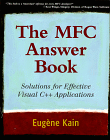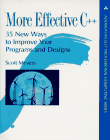|
Learning C++ |
| You might as well ditch all your other C++ books as this one cannot be beat. This book is so good it should be the standard against which all other books on the subject should be measured. The section on the STL is a nice addition to this edition. Prata explains everything clearly and without talking over your head but still maintaining a technical discussion. Nice work. Get this book if you are learning C++ or just want to improve your skills. You can't go wrong! |
Advanced Windows C++ Programming Books |
| A professional programmer is one who knows not just how to do things, but also why. In this regard, Visual C++ Programming is an excellent choice due to its comprehensive coverage of all aspects related to Windows programming. It discusses in detail the underlying mechanism of Win API and MFC providing invaluable tips and insights for true professionals. However, it's not confined to theoretical concepts exclusively but also explains how to use the debugger, class wizard, AppWizard, resource editor - all of which are integral parts of the Visual C++ environment. New features offered by Visual C++ 6.0 such as IntelliSense, edit and continue, and auto complete are described as well. | |
| This book will save you days of frustration by
providing answers to more than 130 tough, real-world programming questions, such as *
How do I make my application remember the last active document and automatically reopen
it? The MFC Answer Book offers the shortest path from frequently encountered programming problems to corresponding step-by-step solutions that you can integrate immediately into your current project. |
C++ Morality Guides |
|
|
The first edition of Effective C++ sold nearly 100,000 copies and was translated into four languages. It's easy to understand why. Scott Meyers' practical approach to C++ described the rules of thumb employed by the experts -- the things they almost always do or almost always avoid doing -- to produce clear, correct, efficient code. Each of this book's 50 guidelines summarizes a way to write better C++, and the accompanying discussions are backed by specific examples. For this new edition, Meyers reworked every guideline in the book. The result is exceptional adherence to C++'s Draft International Standard, current compiler technology, and the latest insights into the use of C++ for real-world applications. Highlights of Effective C++, 2nd Edition include: expert guidance on object-oriented design, class design, and the proper use of inheritance; an examination of the standard C++ library, including how the Standard Template Library and classes like string and vector affect the structure of well-written programs; discussions of late-breaking language features like in-class constant initializations, namespaces, and member templates; and wisdom usually possessed by only the most experienced developers. Effective C++ continues to be essential reading for every developer working with C. |
| For programmers at the intermediate level and above. This sequel to the author's Effective C++ provides methods for improving program efficiency. Coverage includes examinations of the time/space costs of C++ language features; descriptions of advanced techniques (placement new, virtual constructors, smart pointers, reference county proxy classes, and double-dispatching); examples of the impact of exception handling; and treatment of new language features (e.g. bool, mutable, explicit, namespaces, member templates). Annotation c. by Book News, Inc., Portland, Or. |
Sorting |
| The first revision of this third volume is the most comprehensive survey of classical computer techniques for sorting and searching. It extends the treatment of data structures in Volume 1 to consider both large and small databases and internal and external memories. The book contains a selection of carefully checked computer methods, with a quantitative analysis of their efficiency. Outstanding features of the second edition include a revised section on optimum sorting and new discussions of the theory of permutations and of universal hashing. | |
| Both rigorous and complete, this introduction covers traditional material and modern developments: elementary data structures, sorting graph algorithms and NP-completeness are included along with material on Fibonacci heaps, parallel algorithms, network flow algorithms, computational geometry, and number-theoretic algorithms. Annotation copyright Book News, Inc. Portland, Or. |








